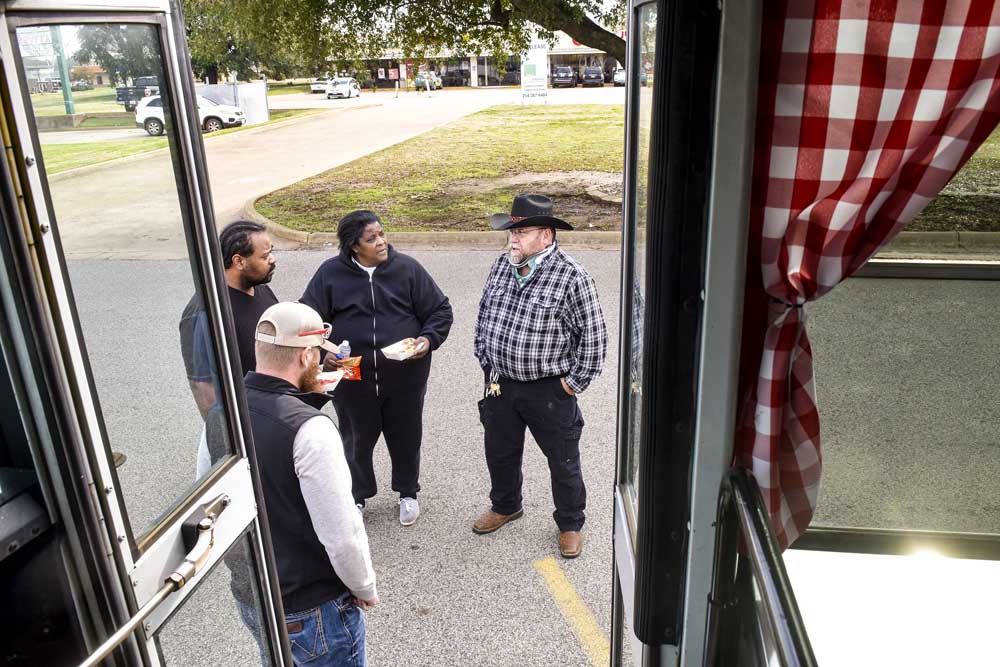Jacksonville nonprofit converts bus into ’50s diner soup kitchen, plans to build tiny home community for homeless veterans
Published 3:27 pm Saturday, January 12, 2019

- Darryl Devereaux, Chase Delaney, Doris Deckard and David Peters chat after Devereaux and Delaney stopped by to get lunch during a promotional kickoff event for East Texas Sheltering Arms Coalition's mobile soup kitchen diner in the Walmart parking lot in Jacksonville, Texas, on Tuesday, Jan 1, 2019. Peters is the founder of East Texas Sheltering Arms Coalition, a nonprofit dedicated to serving homeless veterans, though Peters says the mobile soup kitchen diner he built will serve food to anyone who needs it. He also plans to build a tiny home community for homeless veterans to live in. (Chelsea Purgahn/Tyler Morning Telegraph)
David Peters isn’t the kind of guy who sits still when there’s time to kill.
It wasn’t long after he retired in Jacksonville after 30 years in the construction business that he began working part-time at the post office. He then took a full-time position in 2015 at the Smith County Juvenile Detention Center, where he created the vocational community-service supervisor role.
Still, Peters wanted to be doing more, specifically, more mission work in his community.
“I’ve always felt like mission work wasn’t necessarily just going off to other countries, that there was a lot of mission field right here in our own backyard that gets overlooked and ignored,” he said.
In the middle of 2016, Peters was approached to serve on the board of then-nonprofit Mercy’s Refuge. It clicked for him that this was what he needed to do.
From fundraising to working on projects, Peters gave 110 percent. By December 2016, he felt his goals and efforts weren’t aligning with others on the board.
“My wife told me to think hard about what I was doing before I got further into it, if it was where God wanted me to be. I realized it wasn’t the right place for me so I resigned from the board, but I was already kind of hooked and I couldn’t walk away from it,” he said. “I realized that God used that time to get me off the couch and get me involved and show me that I could do it.”
Wasting no time, Peters on Jan. 1, 2017, started his own nonprofit, East Texas Sheltering Arms Coalition, whose mission is to develop a coalition to end homelessness of veterans in East Texas.
“I have a passion for the homeless but even more so for the veterans because of the sacrifices they’ve made — they get forgotten a lot of times,” he said.
While the main goal of Sheltering Arms is to build a tiny-home community for homeless veterans, Peters had bought a 71-passenger school bus, back when he was with Mercy’s Refuge, to turn into a mobile soup kitchen and diner.
He talked with his board about pursuing this project first so the organization could better establish relationships with the homeless population.
“The more I was finding out about working with the homeless and trying to develop relationships with them is it’s a long drawn out process,” he said. “I decided that if the tiny home community was going to be successful that the bus was going to be a big part of that, being out on the street and building those relationships with those individuals.”
Once the decision was made to pursue the bus project, Peters got to work. Throughout 2018, he ripped up the old floor in the bus and put in new vinyl, painted the interior and exterior and installed sinks, a warming cabinet, prep station, counters and more.
The youth at the detention center helped build a rack that holds the generator as part of their community-service programming.
“It was like a jigsaw puzzle, Peters said. “I knew what I wanted to have in the bus but I didn’t know exactly how it was all going to fit.” Most of the bar stools he was looking at were too high for the counters he’d installed, but he eventually found some short stools that were intended for table top video gaming like Pacman.
The bus now feels like a little ’50s diner thanks to the Peters’ personal touches. The floors are black and white checkered; the counters, a classic stainless steel look; red and white checkered curtains are neatly tied and adorn each window on the bus; he even replaced the stop sign on the side of the school bus with an LED open sign.
About $5,000 went into the bus remodel through the year Peters worked on it.
After a test run at his church, Peters and a few volunteers brought the mobile diner to the Walmart parking lot in Jacksonville on New Year’s Day for a promotional kickoff. The aim was to make people more aware of their nonprofit and to feed anyone who was in need of a meal.
More than 50 people stopped by that day. Some came to eat, some donated and ate and some just stopped by to donate to the cause.
One man saw the Bible verse on the side of the bus, Matthew 25:42-43, and took it as a sign to stop and talk to them about his sister’s drug addiction and ask about ways he could help her.
“Sometimes helping someone isn’t just doing things for them but finding the right person who knows how to help them and knows ways of helping them without just giving them things,” Peters said, talking about how they gave the man information which could aid his sister, and reinforcing the idea that he wants to work with other organizations so they can all better help the community.
“I would say it’s a great feeling of achievement (to be finished with the bus) but not necessarily a feeling of relief because the next step is just as hard and there will be just as many obstacles to keep running,” Peters said. He hopes to take the bus out every Sunday to serve the homeless, a day he found out there are not currently meals being served after talking to other organizations.
Peters estimates it will cost about $200 each week to cover fuel and food, once they are in a good rhythm and have steady volunteers for the bus.
Sheltering Arms is now focusing on its tiny home community project.
Peters is hoping to build the community on between 10 to 40 acres of land in Cherokee County.
“It’s the vision of a military base with a commissary and a mess hall, and the tiny homes being replica of the barracks to give them that sense of community that they knew when they were in the military,” he said.
“The community will be what we consider to be a hand up, not a handout,” he said.
He envisions having residents work in gardens, with chickens and possibly livestock, participate in vocational training and craft building and run a farmers market.
“We want it to be a working community where everyone has a role. However small or big that role is isn’t important. It’s just that they’re part of the community and they’re helping sustain it,” he said.
Peters is inspired by the work Houston’s Mobile Loaves and Fishes does, and just like that organization, wants to provide whatever help he can and bring in whatever services are needed.
“This is my vision that God gave me, but by no means is it mine. I don’t claim ownership of the nonprofit, but I will give everything I can to it to make it successful,” Peters said. “I want to get to the place where I’m not needed, not because I want to leave the nonprofit, but because it needs to have a life of its own so it can live past me.”
If you would like to donate to or volunteer with East Texas Sheltering Arms Coalition, visit www.shelteringarmscoalition.com.
TWITTER & INSTAGRAM: @Chelsea_Purgahn






